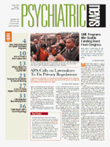It was supposed to be just another night on call. Then my husband suddenly had to go out of town on business. I was admitting two boys to our inpatient unit while their mother, who had allegedly been neglecting the children, was screaming that this was no place for them. And in the middle of all this, I received a page from my babysitter: She had to go to a medical appointment. The evening babysitter called to cancel because of a car breakdown. The kids were at my neighbor’s house.
It is at moments like these that I wonder: Is it possible to combine full-time psychiatry training with being a mother? Is it good for me, good for the kids—good for anybody?
I started medical school when I was 32. That biological clock was ticking. I felt I couldn’t wait. My first daughter was born at the end of the third year of medical school, the second at the end of my third year of residency. I tried to find a supportive medical school (which mine was) and a supportive residency program (which mine was). My husband and I were blessed with fertility, and our timing was perfect. But every now and again, I still wonder if it’s doable and if it’s worth it.
The answer I return to again and again is that being a parent during psychiatry training is unbelievably stressful, but it is also a saving grace. Sleepless nights spent giving Tylenol to sick or teething kids; weekends doing countless loads of laundry, making trips to the grocery store, and chauffeuring to and from birthday parties and sporting events; evenings trying to set up play dates or offer some “quality time”—these all take their toll. And they undoubtedly interfere with regular reading of journals or Medline lit searches, not to mention studying for the boards or writing papers. And that feeling of carrying in one’s head everything from “Remember to write a prescription for that patient” to “Remind Sylvia to bring her sneakers to school; it’s a gym day” can feel overwhelming. The details! So many details!
It’s also true that a snafu in the carefully oiled child care machine can feel like a major disaster. Sick kids, sick babysitter—these are the things that send daily rhythms into complete disarray and prevent peace of mind until they are resolved.
I have found that the moments when it is hardest to be a parent in training are the ones when I feel most depleted. It seems inevitable that it is exactly when the kids are sick, or the babysitter has jury duty, or my husband is feeling stressed at work that my own clinical work also becomes the most demanding: the narcissistic mother who, in her way, pleads desperately for my attention; the out-of-control kid who escalates, causing parents’ frantic calls; the borderline adolescent who cuts herself again, but this time severing an artery and getting herself admitted.
It is also these times that I feel most at risk for making errors of clinical judgment. I have to steel myself not to let my guard down, remind myself that running on empty doesn’t mean clinical demands will fall in sync. Most of all, I have to recall that these are the times to take good care of myself.
Taking good care of me may sound self-indulgent, but I have found it is one of the best antidotes to screwing up when feeling stressed as a parent. It can take the form of going out to dinner, spending time with friends, hanging out with my kids more, or just getting a good night’s sleep. At work, it may also mean going out of my way to ask for extra support from colleagues, getting more supervision from faculty, or finding another player to involve in the team treating a particularly difficult patient.
Clearly, there are ways you can look after yourself at the front end. The best-quality child care you can afford is a good place to start. Lining up lots of backup child care—neighbors, friends, family members—helps a lot. Making sure you and your partner have regular one-on-one time to nurture your relationship is crucial. Getting as much exercise and “playtime” as you can is a definite plus. And budgeting for restful vacations is an absolute necessity.
With those in place, it’s a lot easier to feel the joys of having kids during training. And there are joys. There is nothing like being greeted by your child after a long day at the hospital. The giggles and squeals go a long way toward putting the apparent stresses of the day into perspective. And the gratitude from children for time spent with them is incredibly moving. As my daughter wrote in her first-grade journal entry after a shift in my rotation schedule: “My mom walked me to the bus stop today. She’s the best! I can’t believe she can do it on a Monday!”
There is also a deep satisfaction in child psychiatry in sharing with parents something of your own experience, a sense that you really do know what it’s like. I will always remember the expression on a mother’s face as she looked up over her tear-soaked tissue in a family meeting discussing her teenage son’s new diagnosis of schizophrenia. “Do you have children, Dr. DeJong?,” she asked. “Yes,” I said, as I tried to stop my eyes from welling. “I do.” ▪

